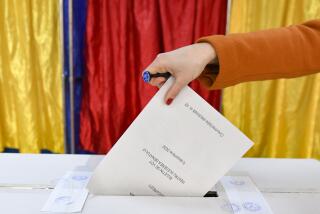U.S. image unharmed by drones and surveillance, global study finds
- Share via
American counterterrorism practices that attack suspects from unmanned drones and expose the private communications of millions are opposed worldwide but haven’t inflicted serious damage on the United States’ image abroad, the Pew Research Center found in a global survey released Monday.
In 48,643 interviews in 44 countries, Pew also found that the United States is more favorably viewed than China in all areas of the world except the Middle East.
In addition, despite a solid majority of the respondents saying they viewed China’s economic prowess as a benefit to their own countries, the Asian superpower’s territorial disputes with its neighbors have raised tensions in the region and made people fearful of a looming war, the research found.
Majorities in 31 of the countries included in the survey conducted over a three-month period this spring deemed U.S. government surveillance of individuals’ private phone calls, emails and texts as “unacceptable.” Those countries where little opposition to the snooping was expressed were exclusively in Asia or Africa, where respect for individual liberties is limited. (Only 18% of Nigerian respondents and 25% of Pakistanis told their interviewers that they opposed the surveillance.)
Survey subjects in all but six of the countries had less problem with U.S. surveillance of terrorist suspects. Only in India, Pakistan, Malaysia, Thailand, Vietnam and South Africa did fewer than 50% of respondents approve of the communications spying when directed at specific suspects.
The use of drones to attack suspected terrorists, another high-profile and controversial practice in Washington’s counterterrorism arsenal, is also widely unpopular in the world, the Pew researchers said in a summary of their findings. In 39 of 44 countries surveyed, majorities or pluralities oppose U.S. drone strikes, the report said.
“Despite these misgivings about signature American policies, a median of 65% across 43 nations express a positive opinion about the U.S.,” Pew concluded. “And these overall ratings are little changed from 2013. This includes a median favorable rating of 74% in Africa, 66% in Europe, 66% in Asia, 65% in Latin America, but just 30% in the Middle East.”
The researchers found President Obama’s standing in the world slightly diminished, largely due to objections to the National Security Agency surveillance programs disclosed by fugitive leaker Edward Snowden. Still, Obama retains the confidence of 56% of the respondents that he would “do the right thing in world affairs,” the survey concluded.
In Germany and Brazil, however, Obama’s standing has dropped significantly in the countries where Snowden’s revelations about the NSA surveillance programs disclosed that even the private cellphones of the leaders were tapped. Germans expressing confidence in Obama dropped from 88% to 71% from a year earlier, and in Brazil, the U.S. leader’s support fell from 69% to 52%.
The global median of 65% positively viewing the United States bested the average rating of China by 16 percentage points. In the 43 other countries surveyed, a median of 49% said they had a favorable view of China.
And while most people asked said they viewed China’s economic success in a positive light, the Middle Kingdom’s recent confrontations over disputed islands in the East and South China Seas have rattled the region, the research findings suggest.
“There are strong concerns in Asia that territorial disputes between China and its neighbors will lead to military conflict,” Pew said. “More than seven-in-10 in the Philippines, Japan, Vietnam, South Korea and India say this is a concern. And two-thirds of Americans agree, as do 62% in China itself.”
Follow @cjwilliamslat for the latest international news 24/7.
More to Read
Sign up for Essential California
The most important California stories and recommendations in your inbox every morning.
You may occasionally receive promotional content from the Los Angeles Times.













